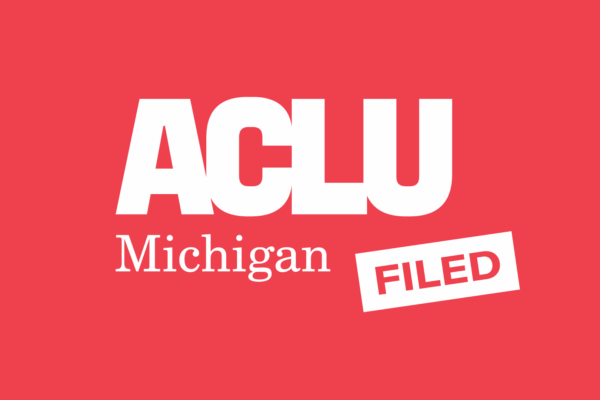FOR IMMEDIATE RELEASE
DETROIT – Today the American Civil Liberties Union of Michigan (ACLU) and global law firm Goodwin filed a federal lawsuit on behalf of Cyrus Patson, a 20-year-old Traverse City resident, to ensure access to his prescribed medication for treatment of opioid use disorder when he expects to be incarcerated. The lawsuit contends that the jail’s policy and practice of denying medication to people who are incarcerated and suffer from opioid use disorder violates the Americans with Disabilities Act and the Eighth Amendment.
Medication for opioid use disorder, also known as MOUD, has been approved by the U.S. Food and Drug Administration (FDA) and is widely regarded as the standard of care for this illness. MOUD is successfully provided in jails and prisons throughout the country, including elsewhere in Michigan, and experts state that administering MOUD in the carceral environment protects vulnerable people, reduces behavioral problems, and diminishes the trafficking of illicit narcotics.
“My entire treatment plan is saving my life – it's helping me live on my own, and hold onto hope for my future,” said Mr. Patson. “My opioid use disorder does not define me, but it is a lifelong battle that I am fighting successfully with the help of the medication my doctor has prescribed, along with regular counseling.”
Mr. Patson, who is currently being treated with MOUD, specifically the medication Suboxone, expects to be sentenced to jail in Grand Traverse County on November 12. If jail administrators continue their policy and practice of refusing to provide prescription Suboxone to people incarcerated in the facility for more than a few days, Mr. Patson will face serious medical consequences and grave risks to his health. Studies have shown that ending MOUD treatment prematurely triggers painful withdrawal symptoms that markedly increase the risk of relapse, overdose, and even death. Indeed, Mr. Patson suffered severe and disabling withdrawal symptoms himself during a prior period of detention at the same jail in which he was denied MOUD.
“Abruptly stopping medically necessary treatment is cruel, discriminatory, and potentially deadly,” said Syeda Davidson, ACLU of Michigan senior staff attorney. “Incarceration does not take away a person’s right to continue doctor-prescribed, life-saving treatment. This applies to people who have opioid use disorder just as it does for people who have any other disability or medical condition. Jail officials have a legal duty to care for and uphold the rights of every single person in their custody. Mr. Patson is no different and should have appropriate access to his medically necessary treatment.”
According to studies cited in today’s lawsuit, the opioid epidemic continues to devastate communities at an exponential rate: from 1999 to 2018, the number of Michiganders who have died from opioid overdoses rose from 118 to 2,036 people. Opioid overdoses are the leading cause of death for Americans under 50-years-old.
“Providing access to medication for the treatment of opioid use disorder to those who are incarcerated is not only feasible, it’s a human right,” said Alexandra Valenti, partner at Goodwin. “We implore the officials of Grand Traverse County to uphold their legal responsibilities and provide Mr. Patson with his physician-prescribed, life-saving medication while he is incarcerated.”
Today’s lawsuit, Patson v. Grand Traverse County et al., was filed in the U.S. District Court for the Western District of Michigan.
###
Stay Informed
Sign up to be the first to hear about how to take action.
By completing this form, I agree to receive occasional emails per the terms of the ACLU’s privacy statement.
By completing this form, I agree to receive occasional emails per the terms of the ACLU’s privacy statement.

